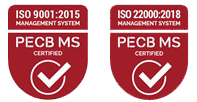When it comes to international trade, it’s important to ensure that imported goods meet all the necessary standards and regulations. This can be quite a complex process. Testing and certification plays a vital role in this process, ensuring consumer safety and environmental protection. In this blog post, we will explore the significance of these measures, the different types of testing needed, and ways to guarantee compliance.
Import Regulations and Required Testing for Goods Entering Nigeria
Nigeria, like many countries, has stringent import regulations in place to protect its citizens and maintain product quality. These regulations often require importers to submit their goods for testing and certification before they can be released for domestic distribution.
The specific tests required can vary depending on the type of goods being imported. Common testing categories include:
- Safety Testing: To ensure that products do not pose a risk to consumer safety.
- Quality Testing: To verify that products meet specified quality standards.
- Environmental Testing: To assess the potential environmental impact of the goods.
- Health Testing: To ensure that products do not pose a health risk, especially for food and pharmaceutical items.
Understanding Certification Standards and Requirements
Certification is a process that verifies that a product meets specific standards or requirements. International organizations or national bodies often set these standards. Some common certification standards include:
- ISO Standards: A series of international standards covering various aspects of quality management, environmental management, and social responsibility.
- CE Marking: A mandatory requirement for certain products sold within the European Union, indicating compliance with EU health, safety, and environmental regulations.
- FDA Approval: Required for many food, drug, and medical device products entering the United States.
Ensuring Compliance Through Proper Documentation
To successfully import goods into Nigeria, importers must provide the necessary documentation to prove that their products have been tested and certified. This documentation may include:
- Test Reports: Detailed reports from accredited testing laboratories.
- Certification Certificates: Documents issued by certification bodies confirming compliance with relevant standards.
- Technical Specifications: Documentation outlining the product’s design, materials, and manufacturing processes.
Conclusion
Testing and certification are essential steps for importers seeking to bring goods into Nigeria. By understanding the relevant regulations, standards, and documentation requirements, businesses can ensure that their products comply with local laws and regulations, protecting their reputation and avoiding costly penalties.
Need assistance with testing and certification? AIML can provide expert guidance and support. Contact us today.


